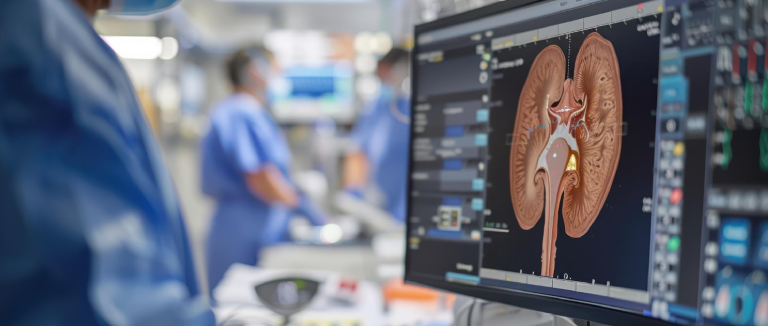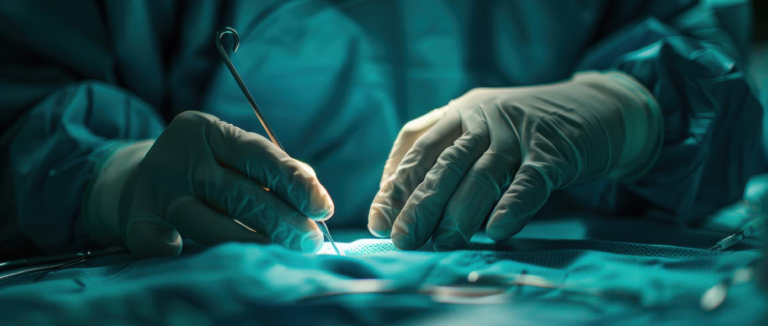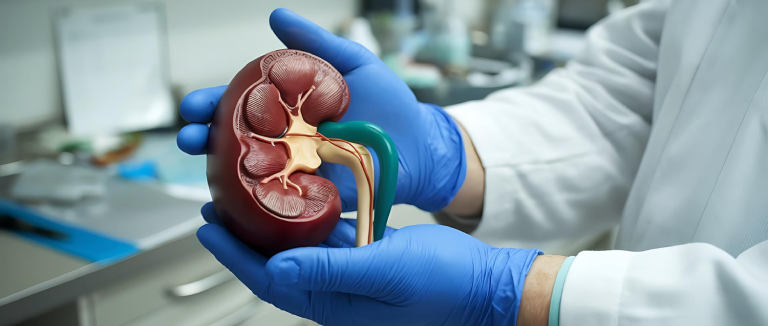Robotic Surgery and Life After Kidney Cancer
Robotic surgery is widely regarded as a groundbreaking advancement, offering kidney cancer patients a smoother and more successful transition into life after treatment. In this blog, we will explore the different aspects of post-transplant life and discuss the transformative impact of robotic surgery in the management of kidney cancer.

The Development of Kidney Cancer Robotic Surgery
Recent years have seen tremendous advancements in kidney cancer robotic surgery, which has completely changed the treatment options available to patients with this challenging diagnosis. Robotics integration in surgery has improved recovery times, decreased invasiveness, and increased precision. Regarding kidney cancer, where surgical procedures are crucial, robotic surgery appears to be a ray of hope. Robotics integration in surgery has improved recovery times, decreased invasiveness, and increased precision.
Robotic surgery appears to be a ray of hope where surgical procedures are crucial for diseases such as kidney cancer.
The experience of having kidney cancer treated with robotic surgery is marked by a blend of advanced medical technology and highly qualified healthcare providers. A robotic system that a surgeon controls from a console is used to provide a magnified, three-dimensional view of the surgical site. With the help of robotic instruments and high-definition visualization, surgeons can execute intricate strategies more accurately and with greater ease.
Why Do People Choose Robotic Kidney Cancer Surgeries?
For patients and their families, a kidney cancer diagnosis often marks the beginning of a period filled with uncertainty and emotional challenges. Each journey from diagnosis to treatment is unique, and the advent of robotic surgery introduces new hope in ways that were not previously possible. By choosing robotic surgery, kidney cancer patients position themselves at the forefront of medical innovation, with the promise of improved outcomes and a faster return to normal life.
Robotic Surgery: Advancing Long-Term Health Outcomes
Patients who undergo robotic surgery experience not only immediate benefits after the procedure but also long-term advantages in their recovery from kidney cancer. The precision and reliability of robotic techniques help reduce the risk of complications and lower the likelihood of cancer recurrence. As a result, patients can focus on leading fulfilling lives without the persistent concern of cancer overshadowing their future.
Enhancing Precision in Kidney Cancer Treatment
Accuracy is essential in the treatment of kidney cancer, and the enhanced precision made possible by robotic surgery is truly remarkable. With the support of advanced technology, surgeons can target cancerous tissues more accurately while minimizing harm to surrounding healthy structures. Robotic arms allow for highly controlled, intricate movements, enabling the effective removal of tumors with a reduced risk of complications.

Developments in Image-Assisted Robotics
The future is bright when considering the use of robotic surgery in kidney cancer treatment and the life-changing experience following a transplant. The field of kidney cancer treatment is still being shaped by ongoing research and technological developments, giving hope for even more advanced and individualized treatments. The future is a blank canvas full of hope, resiliency, and the possibility of a life fully lived for those who have overcome the obstacles presented by kidney cancer and welcomed the possibilities of robotic surgery.
Researchers are exploring the potential of combining robotic surgery with state-of-the-art imaging technologies, which could significantly change kidney cancer diagnosis and treatment. The possibilities for surgical achievement may be expanded by combining robotic instruments’ precision and real-time imaging capabilities. This combination of technologies could lead to more successful treatment plans and improve the surgeon’s capacity to see tumors precisely.
Robots and Personalized Medicine
Another area of great promise for patients with kidney cancer is the development of personalized medicine. The combination of robotic surgery and genetic profiling may open the door to customized treatment plans that take into account the particulars of every patient’s cancer. This personalized approach may result in more focused and efficient interventions by minimizing the impact on healthy tissues and maximizing overall results.
Their lives demonstrate the resilience of people who have overcome kidney cancer after kidney transplants. A more optimistic outlook for the future and a more seamless recovery are enhanced by including robotic surgery in the treatment paradigm. As we honor the achievements of medical innovation and the tenacity of individuals undergoing transplants, it is evident that life after transplantation is not merely a continuation but a dynamic new chapter full of opportunities.
Contact Liv Hospital experts in Istanbul to proceed with robotic surgery treatments in Turkey!

Thriving After Transplant: Navigating Challenges and Embracing Recovery
While a kidney transplant often brings a renewed sense of independence, it can also present a range of challenges. Patients may find it difficult to manage new medications, adapt to dietary changes, and cope with the psychological impact of transplantation. However, the resilience fostered by overcoming kidney cancer and undergoing robotic surgery equips individuals to confront these obstacles with courage and determination.
Recovery After Robotic Surgery
One of the main benefits of robotic surgery for kidney cancer is how it affects the patient’s ability to recover after surgery. Automated procedures usually lead to shorter hospital stays and less downtime than traditional open surgery. For those eager to return to their regular activities and restore a sense of normalcy in their lives, this expedited recovery is a game-changer.
People should concentrate on reestablishing their mental and physical health during the post-transplant phase. Following a kidney transplant, maintaining a healthy lifestyle, taking prescription medications as directed, and visiting the doctor regularly are essential parts of daily living. Equally important is the emotional side of recovery, where many people find comfort and support in peer groups and counseling.
After Transplantation
A significant turning point in the life of someone who has fought kidney cancer is receiving a kidney transplant. After a transplant goes well, the recipient moves into a new stage of life where the limitations of chronic kidney disease no longer limit them. The incorporation of robotic surgery into the therapeutic regimen adds to the generally optimistic view since the procedure’s minimally invasive nature facilitates a more seamless transition into this new phase of life.
Liv Hospital offers advanced treatment methods for those looking for treatments in Istanbul. Contact us!
Liv Hospital For Kidney Cancer Robotic Surgery
Liv Hospital in Turkey is recognized for delivering world-class medical services across its seven locations, embodying a “Leading International Vision.” With state-of-the-art facilities and pioneering medical care, Liv Hospital stands at the forefront of international healthcare advancements. To learn more about advanced kidney cancer treatments, including robotic surgery, and to inquire about treatment pricing in Turkey, contact our specialists in Istanbul today.
* Liv Hospital Editorial Board has contributed to the publication of this content .
* Contents of this page is for informational purposes only. Please consult your doctor for diagnosis and treatment. The content of this page does not include information on medicinal health care at Liv Hospital .
For more information about our academic and training initiatives, visit Liv Hospital Academy
Frequently Asked Questions Kidney Cancer Surgery
What is kidney cancer, and which type is most common?
Kidney cancer occurs when kidney cells grow uncontrollably. The most common adult type is renal cell carcinoma (RCC). Less common subtypes include papillary and chromophobe RCC.
What are the most common symptoms of kidney cancer?
Typical signs include blood in the urine (sometimes microscopic), persistent flank or back pain, unexplained weight loss, fatigue, fevers, and occasionally a palpable abdominal mass. Some people have no symptoms, and the tumor is found incidentally on imaging.
How is kidney cancer diagnosed?
Diagnosis usually relies on imaging such as ultrasound and contrast-enhanced CT or MRI to characterize a kidney mass. Blood and urine tests assess overall health and kidney function. A biopsy may be used in selected cases to confirm the tumor type before treatment.
How is kidney cancer treated, and where does robotic surgery fit?
Treatment depends on tumor size, location, spread, and overall health. Options include partial nephrectomy (removing the tumor while preserving kidney tissue), radical nephrectomy (removing the entire kidney), ablation for small tumors, and systemic therapies for advanced disease. Robotic-assisted surgery is commonly used for partial or radical nephrectomy to enhance precision through minimally invasive techniques.
What are the potential benefits of robotic surgery for kidney cancer?
Robotic systems offer 3D magnified visualization and wristed instruments that can improve precision. Compared with traditional open surgery, patients often experience smaller incisions, less blood loss, reduced pain, shorter hospital stays, and quicker return to daily activities, while aiming to preserve kidney function when feasible.
What does recovery look like after robotic kidney surgery?
Many patients walk the day of or after surgery, transition to oral pain control quickly, and go home sooner than with open surgery. Expect activity restrictions for a short period, wound care instructions, and follow-up to review pathology and plan surveillance. Fatigue is common initially and improves week by week.
How is long term follow up handled after treatment?
Follow-up typically includes scheduled imaging (e.g., CT/MRI or ultrasound) and labs to monitor for recurrence and assess kidney function. The schedule is tailored to the cancer stage and treatment type. Lifestyle measures, such as smoking cessation, maintaining a healthy weight, controlling blood pressure, and staying active, support long-term kidney and overall health.























